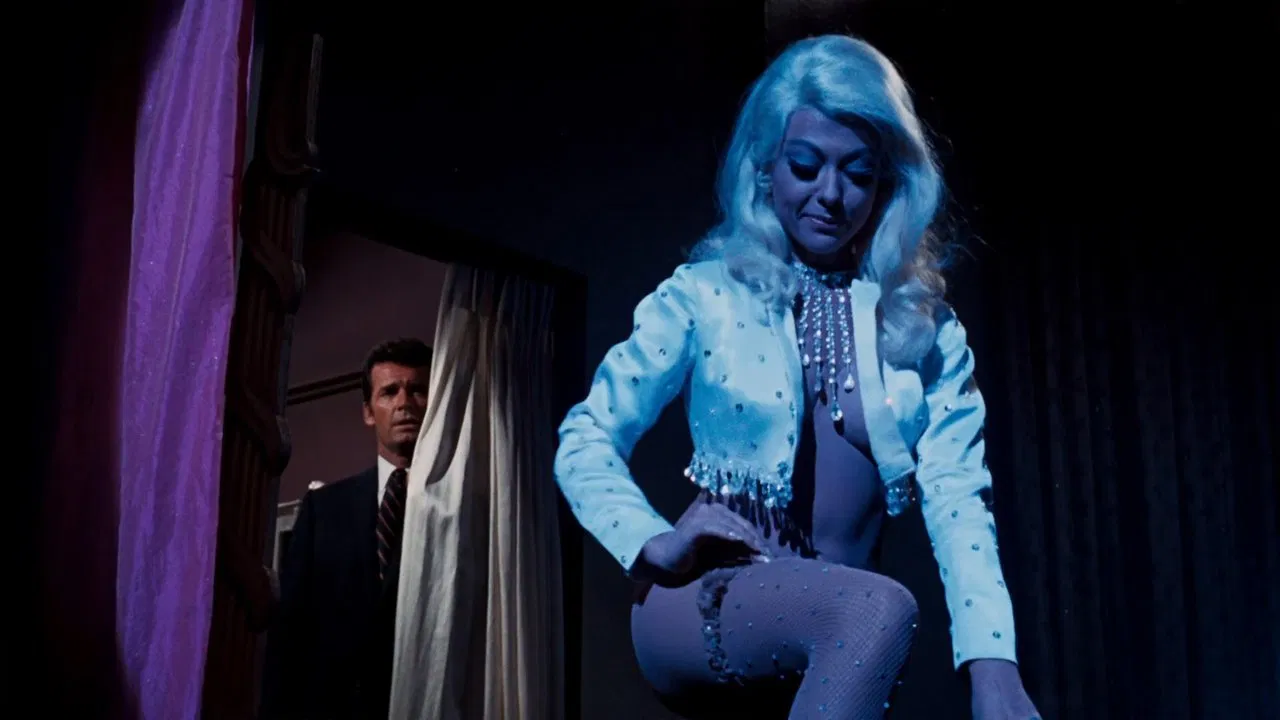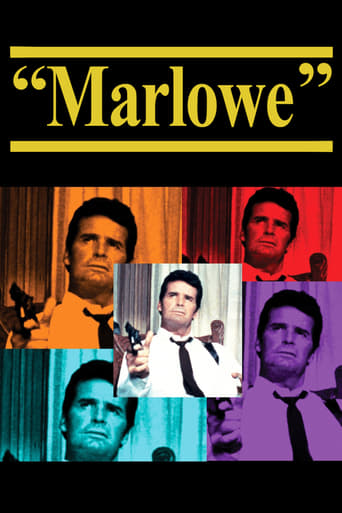

This Movie Can Only Be Described With One Word.
... View MoreA Brilliant Conflict
... View MoreI enjoyed watching this film and would recommend other to give it a try , (as I am) but this movie, although enjoyable to watch due to the better than average acting fails to add anything new to its storyline that is all too familiar to these types of movies.
... View MoreOne of the film's great tricks is that, for a time, you think it will go down a rabbit hole of unrealistic glorification.
... View MoreMARLOWE is a curious case of contemporizing a '40s hard-boiled icon into '60s mod style (hotel rooms are pads, cops are fuzz, you get the gist). Some of it works, some doesn't. The story's nothing special, but the casting is the movie's real sales pitch. William Daniels and Carroll O'Connor are highlights, and Bruce Lee's bit part makes a novel entrance from out of nowhere. Let's not forget the gorgeous Rita Moreno.It's James Garner who ably carries the movie on his shoulders, and turns out to be a great Philip Marlowe. He can play tough, he's at ease with the wisecracks, and fits this movie's time period. I really do like his performance, and I wish he'd gotten to play the role again in another entry ... preferably with a tighter story.6/10
... View MoreMuch as I like Robert Altman's 1973 riff on Chandler's The Long Goodbye, I find it strange this James Garner/Paul Bogart take on The Little Sister, made four years earlier, is often overlooked, and that many critics consider Garner miscast as hardboiled Philip Marlowe. There are so many similarities between the two films, it seems impossible to think Altman was not influenced by this earlier effort.As with Chandler's novels, the thread of familial relationships runs strongly in the background of both movies. Marlowe helmer Paul Bogart's daughter Jennifer was married to The Long Goodbye's star Elliot Gould during this period. As if that isn't co-incidence enough, the father and daughter share the same surname as Humphrey Bogart, who is held by many (though not me) to be the ideal Marlowe in the 1946 The Big Sleep.There are further co-incidences of an almost familial nature. Gayle Hunnicut, female star of Marlowe, reappears as a femme fatale in the Powers Boothe Marlowe series of the 1980s, while the apartment Gould uses in The Long Goodbye also makes a guest appearance in the Boothe episodes. Also The Long Goodbye's script writer Leigh Brackett co-wrote the screenplay to the Bogie The Big Sleep almost three decades earlier. The coincidences just keep mounting up...But let's just look at the similarities now between Marlowe and The Long Goodbye.* Both tales are updated from their 1940s settings, but in both Marlowe is obviously a man out of his time. His ethics, dress and moral code are at odds with everyone else around him. In both films, Marlowe could easily be a figure from the '40s instead of the updated setting he finds himself in.* The hippy, drug culture of the 1960s and 1970s is visible it the background of both films. This counterculture only goes to underscore how Marlowe is entirely out of step with the times he finds himself in.* In both films, Marlowe is closer to Chandler's errant knight, going down mean streets while himself being mean, than the two-fisted Humphrey Bogart of Howard Hawks's The Big Sleep.* Both films have enigmatic endings, and leave Marlowe walking away from crime scenes in a way he did not in the novels; it is almost as if the 1940s morals make Marlowe so sick to the stomach he can't be bother with clearing the modern messes he finds himself in any more. * Both films have music scores that consist of different versions of the same tune being played over and over, though sadly the score to the 1969 film never seems to have been released.OK, so some of things elements are implicit in the books. Marlowe's morality was as probably as outdated in 1940s Hollywood as it was in the same town 30 years later, and the ending of Chandler's novel The High Window is at least as enigmatic as the endings of these two films, in the fact that the true guilty parties are never punished. Also, both films are in keeping with their era. A trait they share with another underrated Marlowe film, the 1978 remake of The Big Sleep with Robert Mitchum (which for my money is better than the Bogart/Hawks version any day for being much closer to the book, despite being directed by perennial journeyman Michael Winner) is that of being updated to the-then present day. However, Winner goes a step further than Bogart or Altman by moving the action to Britain -- a glossy, glamorous London, unrecognisable as such to those who lived there at the time, to be sure, and as much a fantasy as Bay City in Chandler country -- but this change in locale underscores the universality of the world Chandler had created.The crimes in all these stories would not be out of place today and had their equivalent in the times of that other great Marlowe, Christopher, and his contemporary, Shakespeare. The small, mucky, grubby crimes of the Quests, the Wades/Lennoxes and the Sternwoods, as well as the perpetually corrupt police and double-dealing officials, small-time reporters and shiftless grifters, are as true of the real underworld today as they were when Chandler wrote his stories, or even a thousand years before that.In Marlowe, it is human nature that is on display, and the themes of the story -- family breakdown, blackmail, murder and someone with the courage to stand up against such human excrescence -- would work as well in the internet age as the did in 1969. Perhaps even better.It's true this film has faded more than The Long Goodbye. Its obvious back projection and TV-style photography sometimes let it down and the fashions look more dated than in the other Marlowe films of the same era, despite being only a little older than them. (Indeed, it plays as trail-run for Garner's later TV success, The Rockford Files.) But for all that, it is as entertaining and as thought-provoking as Altman's film, and Garner's performance carries the whole thing effortlessly along. It is an unjustly ignored treasure rather than a guilty pleasure.
... View MoreTaking a brief break from a string of obscure and not so obscure horror movies, I thought this might provide some light relief. Its bright and colourful enough but the sparkling humour doesn't last too long into the film which becomes pretty complicated but is still fun to watch. True enough to the Chandler story, Garner is maybe just a little too one note. Rita Moreno, on the other hand puts in an amazing performance, complete with a super striptease sequence at the end. Bruce Lee was a surprise participant, providing, what I assume was intended to be a comic turn. This is not as good as the early b/w Chandler movies nor as good as the 1973 Altman movie, The Long Goodbye (Gould might have got some tips from Garner's performance in this) but its a decent enough effort.
... View MoreMarlowe is hired by a little sister to find her missing brother, leading Marlowe into a thicket of crime in the upper-reaches of LA.The script's an adaptation of a Raymond Chandler novel, which means a convoluted plot, to say the least. But it's not the story that's the attraction, at least for me. Instead, it's the many entertaining touches. Of course, there's Bruce Lee redecorating Marlowe's office with his feet, coming at a time when karate was still an exotic import. That bit of business catches everyone's eye.But note Marlowe's incriminating little tete-a-tete with Orpha-Mae in the train station's snack bar. Now, director Bogart could have made it just a conventionally staged conversation. But he doesn't. Instead, he sticks a bystander between the two, who can't help but eavesdrop on the gruesome tale of murder that's being discussed. Note the bystander's low-key reactions. They're hilarious. She's just trying to eat her lunch and here she is in the middle of details to a killing, whether she likes it or not. Thus, a moment of exposition is expanded into an amusing bit of by-play. Or, on a different note, catch Marlowe entering an office, where it's not a conventional entrance. Instead, it's an office girl's shapely rear end that confronts Marlowe and us as he enters. In fact, the staging is both colorful and inventive throughout. It's a tribute, I think, to director Bogart, who's been elevated from the ranks of TV directors, and proves his stuff. Anyway, if you have trouble figuring out who did what to whom, don't feel alone. From what I read, Chandler didn't like tidy plots since reality itself doesn't come pre-packaged, or some such. So keep a scorecard handy. But streamlined or not, the movie's still an entertaining eyeful.
... View More